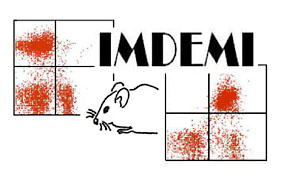| Overall Objectives |  |
| Overall Objectives |  |
|
For the development of effective therapies for many different diseases a better
understanding of both pathogenicity and efficacy of an immune response and especially immune modulation is
required For an increasing number of diseases it becomes clear that an unbalanced immune response contributes substantially to their pathogenesis. The immune system can be involved in the initial phase of the disease because of auto immune responses - either spontaneous or triggered by infections - switching on a cascade of pathogenic events (e.g. in arthritis) or in a later phase as a consequence of the presence of immunogenic neo-epitopes and other morphologic and physiologic changes that result in the exposure of antigens that normally are only present in very small amounts or in another cellular context (e.g. encephalomyelitis, muscle dystrophy). Moreover, we are faced with an increasing number of patients suffering from infections of pathogens resistant to antibiotics. These patients would be helped by therapeutic interventions that increase the efficacy of their protective natural immunity. Progress in immunology would substantially accelerate by improving the efficacy and success rate of the generation of genetically modified mouse models and their phenotypic analysis in the context of a coherent research network In the functional analysis of human diseases and the role of the immune system therein mouse models have proven to be very informative. Recent developments have improved these mouse models considerably not only on the level of modifying the mouse genome (e.g. conditional KOs) but also in phenotypic analysis (e.g. in vivo imaging). On the other hand the number of time and labour consuming steps required for the generation of these models is substantially increased, as is the risks that at the end the models do not fulfil the high expectations. Therefore, many scientific policy makers and individual investigators are discouraged to invest in the development of new innovative genetically modified mouse models. Moreover, to unravel even only one particular aspect of a disease process usually combinations of transgenic and KO mice are required as are a large number of different functional assays and disease models to define the phenotype of one particular KO. Therefore IMDEMI was founded, an extensive research network designed to attain this aim On the basis of state-of-the-art technology a number of new innovative genetically modified mice will be generated for the in vivo analysis of both protective and pathogenic aspects of immune responses in a variety of human disease models. The strategic choice of the new genetically modified mouse models is based on the following criteria: General applicability: relevant for as many as possible research objectives of the participating research groups Scientific significance: the expected contribution to new insights in the immune
mechanisms being analysed in the context of Innovation: enlargement of the technical opportunities of genetically modified mouse models Medical significance: applicability in the development of new intervention strategies
in auto immunity and immune regulation |
|
[ Home | The Network | The Mouse Models | Research Methods | Individual Profile of the Participating Research Groups | Overview IMDEMI Researchers | Training and Transfer of Knowledge Activities | Mouse Locator | Contact | Links ] |
This page was |